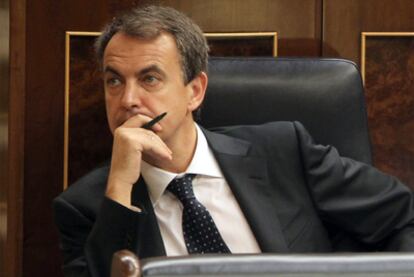Zapatero augurs five-year cure for economy
PM sketches broad reform plan for this government and the next, whoever is in power
It will take "at least five years" to correct the "structural imbalances" in the Spanish economy, Prime Minister José Luis Rodríguez Zapatero warned in Congress on Wednesday. Given that this period encompasses what is left of his Socialist government's current term and a good portion of the next, with elections slated for 2012, Zapatero called for significant accords among political groups because recovery is "a collective task" and not the job of any particular government - "no matter what its political stripes."
The Spanish leader then listed the pending tasks that the country will have to tackle during this "decisive five-year" period: guaranteeing fiscal stability in the long run, a goal in which he included pension reform; modernizing "labor institutions, which have demonstrated chronic rigidity;" reforming professional services; reducing the administrative burden; reinforcing regional cooperation to eliminate differences between the regions; reaching a deal on the make-up of the energy industry; and consolidating the welfare state.
Opposition leader Rajoy declared a Christmas ceasefire akin to the Greek Olympic truce
The final congressional session of the year enjoyed something akin to a Christmas ceasefire that opposition Popular Party (PP) leader Mariano Rajoy compared to the truces that used to be declared in Ancient Greece during the Olympic Games.
Not only did the conservative reduce his usual flow of anti-government criticism, but he said his party will vote in favor of reforming the Lisbon Treaty in order to incorporate a new financial stability mechanism. Rajoy also offered a pact on the EU budgetary framework for 2014-2020, when Spain will become a net contributor to Europe's coffers.
Zapatero acknowledged the conciliatory gesture and called Rajoy's speech "reasonable and constructive," adding he felt confident that this tone was not just the result of "the Christmas spirit." His laying out of a five-year timetable to mend Spain's economy will raise eyebrows amongst analysts, coming two days after he told journalists that he had made a decision on whether he would stand for a third term, but that this was not the time to inform the public on the matter.
The Socialist leader, however, denied that Spain was the mirror that all Europe looked into under the José María Aznar Popular Party governments of 1996-2004, as Rajoy had claimed, and noted that in the last 15 years the Spanish economy has been steadily losing competitiveness.
During the eight years of PP rule, productivity grew 0.4 percent annually, compared with 0.6 percent under Socialist administrations, he argued. This compares poorly with an average of 1.7 percent for the European Union and 2.2 percent for the United States during the same period. It is this growing gap that is at the origin of the current Spanish deficit, said Zapatero, and not in lack of action on the part of his own government. Although he avoided an in-depth debate on the thorny topic of pension reform, Zapatero said that pushing the legal retirement age to 67, up from 65, is not a message for the markets but for young Spaniards, who will thus be guaranteed a pension worthy of the name.
Citing Germany and Sweden, who made the same reform years ago, Zapatero said that if "a reasonable effort" is not made now, a day will come when Spanish society will be facing a wall that may be impossible to overcome.
The leaders of the labor unions CCOO and UGT, Ignacio Fernández Toxo and Cándido Méndez, met with Zapatero and Labor Minister Valeriano Gómez on Sunday at La Moncloa to find common ground on the topic of pension reform, although the meeting failed to produce any agreements.

Tu suscripción se está usando en otro dispositivo
¿Quieres añadir otro usuario a tu suscripción?
Si continúas leyendo en este dispositivo, no se podrá leer en el otro.
FlechaTu suscripción se está usando en otro dispositivo y solo puedes acceder a EL PAÍS desde un dispositivo a la vez.
Si quieres compartir tu cuenta, cambia tu suscripción a la modalidad Premium, así podrás añadir otro usuario. Cada uno accederá con su propia cuenta de email, lo que os permitirá personalizar vuestra experiencia en EL PAÍS.
¿Tienes una suscripción de empresa? Accede aquí para contratar más cuentas.
En el caso de no saber quién está usando tu cuenta, te recomendamos cambiar tu contraseña aquí.
Si decides continuar compartiendo tu cuenta, este mensaje se mostrará en tu dispositivo y en el de la otra persona que está usando tu cuenta de forma indefinida, afectando a tu experiencia de lectura. Puedes consultar aquí los términos y condiciones de la suscripción digital.








































